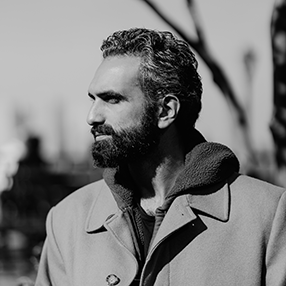Wanting a Child
Here in California, we can drive through any
landscape, field, flower, forest, all in reach,
at sunset, affording not to notice the exhaust
left in our stead. A daytrip takes us to the edge
of the continent, leaning out over some precipice,
looking back. We are home by dinner, the house
soft color, where our bodies move through dark’s
thin language and something calls, urgently, from after.
Some days I don’t know if it’s fair of me, built
as I am, a man, unable to carry every inch of an idea
into the future. In Gubbio, each spring brings
the same pageant. Up hills of the medieval town,
up streets obscured by screaming crowds, three teams
of men in bright blouses tumble upward with their tribute.
Up switchbacks, up stone roads smoothed by centuries’
tradition. In the middle of May they come this way, to carry
the wooden paraphrase of candles on their sweating,
rainbowed shoulders. Each four meters tall, an emblem
of a patron saint. The same one wins each year.
All Umbria comes to watch this alias of a race.
But the exertions are real: the men intent, although
they know what little their ardor comes to. They pass
the title on through blood. Each time, the cheers
subside when they touch the basilica. They set
the good things down. What honor it must be
to carry something so beyond you up into
the sky, up toward the face of god. What work
your faith must take. What flagrancy.
Copyright © 2023 by Jay Deshpande. Originally published in Poem-a-Day on May 4, 2023, by the Academy of American Poets.
“The first inspiration for this poem was the Corsa dei Ceri, a religious festival in Gubbio, Italy, dedicated to the town’s patron saint. This obsession, and the poem’s other topics, seemed to have nothing in common until they had everything to say to each other. Writing it, I realized how much I’ve tried in these last few years to protect myself from the risks that come with hoping for something too much. But the wishes remain, even in the face of collapse, despair, and pointlessness. This poem came out of an effort to defend myself from those kinds of longing that felt too dangerous to speak of otherwise. And it let me have my ambivalence, too. The poem was a surprising arrival, and recalled to me W. H. Auden’s definition of poetry as ‘the clear expression of mixed feelings.’”
—Jay Deshpande

